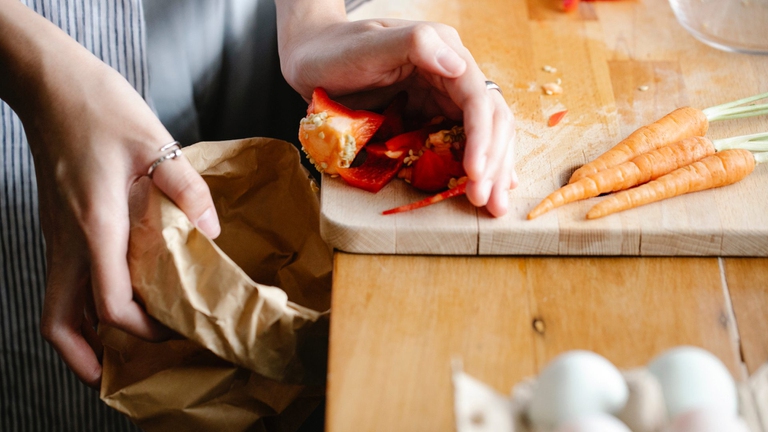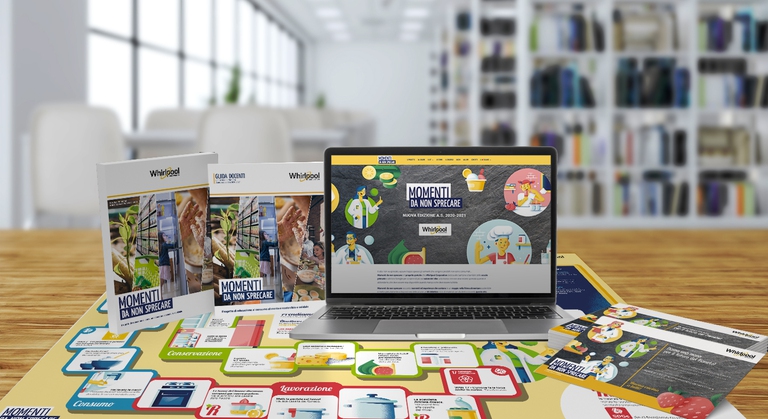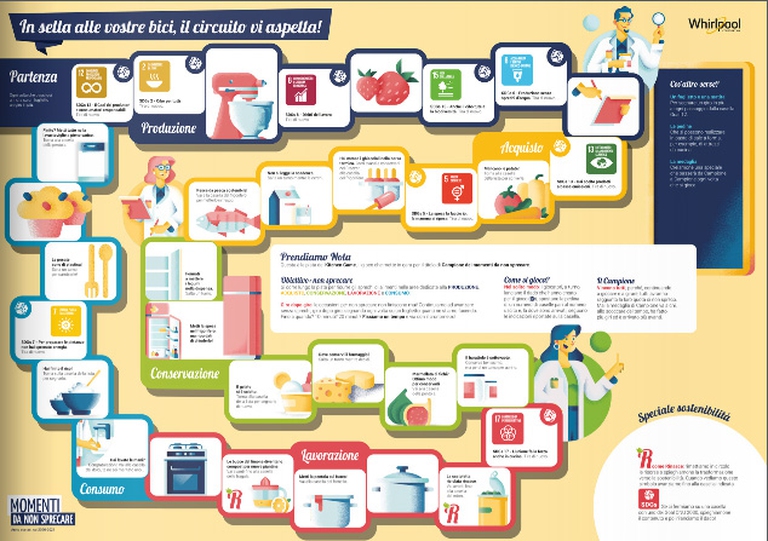
Together with Made in Nature, we explored at the Macfrut fair in Rimini, the Italian organic fruit and vegetable market and its key players.
Through the Moments Not To Be Wasted educational project and the Talent Kitchen contest, Whirlpool teaches schoolchildren about food waste in a rewarding and inclusive way.
At a time in history when 768 million people (almost 10 per cent of humankind) still suffer from hunger, food waste statistics – with 931 million tonnes of food lost in just one year – sound truly intolerable. All the more so given that wasted food is responsible for 38 per cent of total energy consumption in the global food system (data for 2019 from the United Nations’ 2021 Food Waste Index Report). To reduce this percentage would therefore mean significantly reducing greenhouse gas emissions, which are responsible for global warming, while also cutting down the use of precious resources like water and land.
This is why, in a world that’s getting closer to having to feed 8 billion people, our food choices and the power not to waste food are becoming crucial weapons in the fight against environmental catastrophe. The goal of creating sustainable food systems is also enshrined in the UN’s 2030 Agenda, as part of the commitment to “end hunger”.
It might seem likely that the hospitality industry or large-scale distribution is primarily responsible for this huge amount of wasted food. However, household food waste is the main culprit. Of the 931 million tonnes of wasted food, 61 per cent happened within people’s homes. Thus, raising awareness among citizens regarding more careful consumption and more sensible shopping becomes vital. And when attempting to get through to adults to spread good practices and new ideas, children and schools always provide a great way in. This is why more and more companies are deciding to invest their resources and commitment in raising awareness through projects and contests that are aimed at students.
A good example of an educational programme dedicated to the issue of sustainable and inclusive food consumption is Moments Not To Be Wasted, created by Whirlpool and on its fifth edition this year. Through a dedicated online portal, the initiative provides schools with teaching materials and digital kits with which to help students familiarise themselves with anti-waste practices. The content ranges from good kitchen practices and seasonal foods to nutritional balance and methods for preserving and reusing food in the correct way, with the most suitable technological tools.
“Every year, our continent’s citizens waste over 87 million tonnes of food. That’s 173 kilograms per person. These figures don’t just make us think but push us even further towards doing something concrete to combat this phenomenon,” says Maurizio David Sberna, Corporate Communication Director, EMEA at Whirlpool Corporation. “Moments Not To Be Wasted is an educational tool that has proven, for the fifth year running, to help children and families reflect on and learn about sustainable food consumption. As manufacturers of domestic appliances, whose purpose is to improve life in people’s homes, we consider the fight against food waste as a priority both in our social responsibility and sustainability strategy and in our product innovations for efficient food storage and cooking”.
The most recent edition of the project, which saw 1,300 primary schools and over 36,000 students take part throughout Italy, allowed participants to follow a specific path through the five stages of the food supply chain: production, purchase, storage, processing, and consumption. This proved a unique and useful way to discover the nutritional properties of different foods and learn where food is produced, transported, transformed, which resources and what type of processing takes place throughout the entire supply chain, and what the correct ways to store food at home are.
Among the project activities, Whirlpool also included the possibility to take part in a nationwide educational contest called Talent Kitchen – Stories of food not wasted, collecting over 550 submissions from children in 200 classrooms. For the occasion, these young students became anti-waste ambassadors, letting their imaginations run wild and creating drawings, stories, videos, comics, and recipes. Many different ways to try to highlight the importance of embracing more conscious everyday behaviours in the kitchen and at the table, in an original and creative way.
The winners of the contest, selected by a jury made up of school experts, journalists, and representatives from the Banco Alimentare Lombardia food bank and Whirlpool, were the children from classes 2A and 2B at the Giovanni Pascoli primary school in Ripalta Cremasca (Cremona). Their creation was Foody, a friendly character who accompanied them as they discovered the food supply chain and created many anti-waste recipes with their parents. In joint second place were all the classes at Milan’s Istituto Canossiano Limonta, and class 4C at the Giovanni Falcone primary school in Naples, with their interactive projects that involved the whole school in a responsible consumption pathway, even supported by a public service announcement starring an apple.
In parallel to the project, Whirlpool decided to support the Banco Alimentare food bank foundation, making a donation for each class that took part in the Talent Kitchen. This is a concrete way to support the network of organisations working every day in collecting food surplus and redistributing it to charity networks. During the pandemic, this sector once again proved to be indispensable in supporting society’s most marginalised and vulnerable.
“We give heartfelt thanks to Whirlpool who wanted us by its side again in this new edition of the project,” said Giovanni Bruno, president of the Banco Alimentare charity foundation. “It’s important for us to support the education of the younger generations in this fight against food waste. Having received another donation this year, we can continue our food surplus collection and redistribution efforts, contributing to reducing food waste and helping us fulfil the increasing numbers of food support requests we are receiving each day”.
The response recorded this year has already convinced Whirlpool to plan a new edition of the Moments Not To Be Wasted project, with the aim of getting even more schools and countries involved across Europe, the Middle East, Africa, and Russia. For an increasingly global fight against food waste.
Siamo anche su WhatsApp. Segui il canale ufficiale LifeGate per restare aggiornata, aggiornato sulle ultime notizie e sulle nostre attività.
![]()
Quest'opera è distribuita con Licenza Creative Commons Attribuzione - Non commerciale - Non opere derivate 4.0 Internazionale.
Together with Made in Nature, we explored at the Macfrut fair in Rimini, the Italian organic fruit and vegetable market and its key players.
Made in Nature is a project funded by the European Union and Cso Italy to promote the benefits of organic food consumption for our health and that of the environment.
In Glasgow, technological solutions to climate change have been cleared as “natural” but are in contrast with regenerative, biodiversity-centred solutions.
On the hills of Minabe and Tanabe ume fruit has been cultivated alongside oak forests and honeybees for centuries using a method now recognised by the FAO.
The revival of millet farming has been tackling malnutrition and improving the livelihoods of Kutia Kondh tribespeople in Odisha state, in eastern India.
The same tycoons who created factory farms are the ones investing in fake meat. But “real” food can’t be created in laboratories: regenerative agriculture is the only way.
Food waste is a serious problem and we’re paying a dear price for it, but the European Union has many ideas on how to stop it.
Chef Vikas Khanna has been coordinating efforts to feed migrants in desperate conditions due to the coronavirus lockdown in India. A story of compassion.
Factory farming conditions and antibiotic-resistant pathogens emerging as a result of them pose an existential threat to humans in the form of zoonotic diseases. Why it’s time to produce and consume food more thoughtfully.










